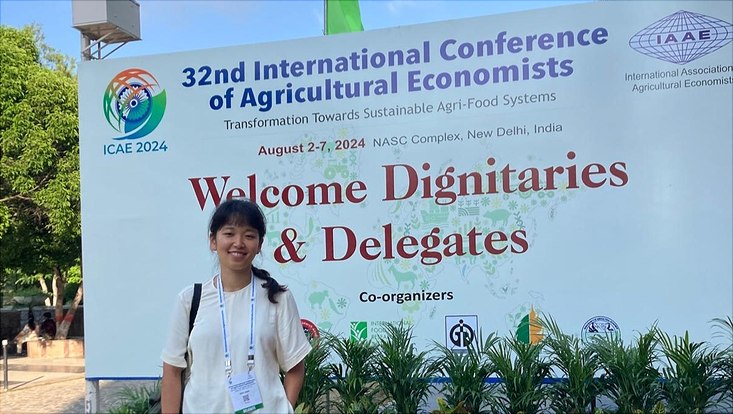Contribution to Namibian Subsistence Farming at ICAE in India
21 August 2024, by Cäcilie Melzer

Photo: Jihye Jeong
Current agri-food systems are not sustainable. Chronic hunger and undernutrition remain stubbornly high and have increased recently due to several overlapping crises. In order to address this issue, the theme of the 32nd International Conference of Agricultural Economists (ICAE-2024) was “Transformation Towards Sustainable Agri-Food Systems”. This year’s conference was held from the 3rd to the 7th of August 2024 at the National Agricultural Science Complex in the vibrant city of New Delhi, India. ICAE 2024 addressed urgent questions on how to make agri-food systems more sustainable with a particular focus on the important role of agricultural economists in facing interdisciplinary challenges. The conference served as platform for the agricultural academic institutions and researchers to convene in person, exchange knowledge, and actively contribute to the global agricultural research community.
PhD student at the FNK, Jihye Jeong, was one of approximately one thousand contributors that participated from all over the world. With her poster, entitled "Cowpea inoculation could improve resource use and nutritional outcomes in Namibia" she presented insights about the culturally well-integrated Namibian subsistence farming which is characterized by an arid climate and sandy soils. The demonstration indicated that inoculation makes production more resource efficient: With 10% of cropland, cowpea can meet the entire national protein demand. Furthermore, the poster demonstrated that low implementation costs, no additional stress on water resources, and improved cowpea production make inoculation an attractive strategy for smallholder farmers in Namibia.

Jihye Jeong is currently engaged in research exploring the adaptation potential of Namibian agriculture under foreseeable future climatic and socioeconomic changes. Her research involves the development and application of optimization models for the Namibian agricultural sector, with the objective of investigating the nexus between climate change and agriculture.


